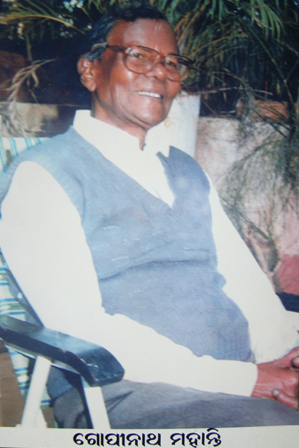Born :- 20-Apr-1914
Died :- 20-Aug-1991
Place of Birth :- Nagabali Village, Cuttack

Shree Gopinath Mohanty is one of the finest and eminent personages of Odisha who introduced the new prose style which was vibrant as well as vigorous with words carefully chosen from the common living speech of villagers and deftly put together for expressing abstract ideas or delicate feelings. He was born in Nagbali village on the outskirts of Cuttack district. His father was Sri Suryamani Mohanty and his mother was Smt. Durgadevi. Gopinath Mohanty was a scholar of rare capability. He held an M.A. degree in English literature with a brilliant academic career all through. He joined the Orissa Administrative Service in 1938 and retired from the service in 1969. Being a govt. Officer, he held many significant positions and carried forward his duties stalwartly. After his retirement, he achieved great success in the field of writing and became a very popular writer. Virtually all aspects of Odisha's landscape, life pattern, culture, and heritage, including those in the tribal land, came alive with his magical hand. In the year 1970, he was awarded for translating Maxim Gorky’s book in Odia language. Furthermore, he was conferred the prestigious D.Litt title by Sambalpur University in 1975. After that, in 1976, he was awarded a Distinguished Visiting Professorship by the U.G.C. for Creative Writing at the Department of English, Utkal University. Later, he was appointed as a member of the advisory of Sahitya Academy (1957-62 & 1983-88) which he served twice. Then in 1981, the government of India conferred upon him Padma Bhushan in recognition of his distinguished contribution to literature. He was an Emeritus Fellow of the Government of India for creative writing. He also accomplished many fellowships for his creativity in literature.
He was the winner of the first-ever Sahitya Akademi Award in 1955 for his novel, “Amrutara Santana” and the first recipient from Odisha, of the highest literary award of the country, Jnanpith in 1974 for his epic fiction, “Matimatala”. He dominated Odia literature for over four decades as a colossus and was hailed as one of the greatest prose writers in India. He was a path-breaker in every way and left his distinctive stamp, whether it was the prose style, technique of handling characters, theme in novels and short stories, codifying the tribal groups and creating grammar in their language, or shedding new light on the time and place of existence. He visualizes life in a blissful manner thinking of the waves playing in the sky, blooming waves, the essence of majestic hills and never-ending dark jungles of Koraput, and the soothing sound of the ocean merging with the endless sky. The magnificence of nature had inspired him and has created the magic within. His serious literary activities began in the 1940s and spanned over 55 years. Gopinath’s creations in print include 25 novels, 11 collections of short stories, 2 anthologies of poems, 2 biographies in Oriya (3 volumes) one auto-biography, 4 plays, 2 critical essays, 5 books on tribal language and culture, 6 translations into Oriya (including his Soviet Land Nehru Award-winning translation of Gorky’s ‘My Universities', Tolstoy’s ‘War and Peace’ and Tagore’s ‘Jogajog’), one biography in English, as well as a number of scholarly essays relating to old palm-leaf manuscripts of Oriya Mahabharata. With the passing away of Gopinath Mohanty in San Jose, California, on August 20, 1991, an epoch that witnessed a creative pursuit of the highest order came to an end. Simultaneously, a powerful voice for the underdog, the down-trodden, and the exploited was silenced. Even after his death, three more stories of his life were compiled in 1995, 2005 & 2007. During his M.A. he wrote a book titled “Kalashakti '' published in the year 1973 on the occasion of the daily life of 16 traditional literary elements of western literature. The autobiography of this genius personality has been published in three volumes. After the prolific author and father of modern Odia literature Fakir Mohan (1848-1918), Gopinath had the eloquent ability to express the silent humor and to feel the sentiment and emotional variations of people with the power of language. His novels show a complete picture of high-quality literary talent. 'Dadibudha' (1944), 'Parja' (1945), 'Amritar Son' (1949), 'Shivbhai' (1955), 'Apahanch' (1961), 'Badhai' (1976) and 'Anam' (1993), the story of the struggle for the lives of the tribals. The seven novels are based on violent attacks against trauma, financial exploitation, gotipratha and injustice and a life-oriented philosophy.
However, Gopinath Mohanty’s immortal words of eternal optimism, “There is zest and taste in life, no death, no sorrow ” (‘Amrutara Santana’) will forever continue to inspire millions all over.
